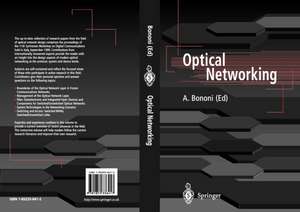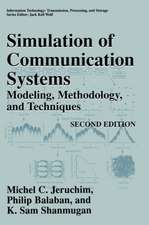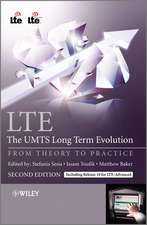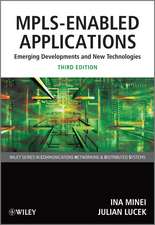Optical Networking
Editat de A. Bononien Limba Engleză Paperback – 17 aug 1999
Preț: 572.95 lei
Preț vechi: 716.19 lei
-20% Nou
Puncte Express: 859
Preț estimativ în valută:
109.64€ • 114.70$ • 91.07£
109.64€ • 114.70$ • 91.07£
Carte tipărită la comandă
Livrare economică 31 martie-05 aprilie
Preluare comenzi: 021 569.72.76
Specificații
ISBN-13: 9781852336417
ISBN-10: 1852336412
Pagini: 416
Ilustrații: XIV, 400 p.
Dimensiuni: 155 x 235 x 22 mm
Greutate: 0.62 kg
Ediția:1999
Editura: SPRINGER LONDON
Colecția Springer
Locul publicării:London, United Kingdom
ISBN-10: 1852336412
Pagini: 416
Ilustrații: XIV, 400 p.
Dimensiuni: 155 x 235 x 22 mm
Greutate: 0.62 kg
Ediția:1999
Editura: SPRINGER LONDON
Colecția Springer
Locul publicării:London, United Kingdom
Public țintă
ResearchDescriere
The new information services provided worldwide through the Internet are fostering the upgrade of existing access and transmission plants, and the de ployment of new ones. The bandwidth bottlenecks of existing electronic plants are being gradually removed by the massive use of optics at all levels. The latest technological developments in optical system components have finally made the huge bandwidth of optical fibers available both for increas ing the amount of transmitted information and for reducing the transmission cost per information bit. Wavelength Division Multiplexing (WDM) is now a commercial reality, widely employed in the upgrade of existing point-to point optical communications links, and in most upcoming newly installed fiber links. High speed Optical Time Division Multiplexing (OTDM) offers a complementary approach to WDM to tap even more into the fiber bandwidth. OTDM is however still in competition with Electronic TDM (ETDM), and as technology in integrated electronics progresses (along with the optical tech nology), the boundary where OTDM becomes more convenient than ETDM is still blurred and is a time-dependent variable. While the main design guidelines for point-to point optical links are now well established, much research work remains to be done in the area of optical networking, where the resources of many interconnected point-to point optical links are time shared. Work is to be done in the transmission field, as well as in the protocol, control and management field.
Cuprins
1 Boundaries of the Optical Network Layer in Future Communications Networks.- An Overview of the Optical Network Layer.- Attributes of the Next Generation Sprint Optical Transport Network.- Internetworking with Domains and All-Optical Islands.- The Optical Layer. What Strategy for the Future?.- Future Optical Metropolitan Area Networks.- KomNet — A Modular Platform to Asses Optical Networking Techniques and Components.- Performance Analysis of Wavelength Division Multiplexing Mesh Networks.- 2 Management of the Optical Network Layer.- Optical Transport Network Management.- Optical Layer Protection and Restoration.- An Overview of Optical Network Standards.- Proposal for a Multivendor Multitechnique NM Architecture.- Supervisory Management and Lightpath Restoration for Wavelength Routing Networks.- The “Moon” Light on TMN and OAM Concepts.- 3 Fiber, Optoelectronic and Integrated-Optic Devices and Components for Switched/Unswitched Optical Networks.- Functional Planar Waveguide Devices.- Micro-mechanical Approaches to Optical Network elements.- Optical Components in Silica-on-Silicon Technology: a European Perspective.- Fast Tunable Filter for Packet-Switched WDM Optical Network.- Highly Efficient Phosphosilicate Raman Fiber Lasers for Optical Amplifiers Pumping.- 4 System Technologies in the Networking Scenario.- Fiber Grating Dispersion Compensators for Advanced WDM Systems.- 40 Gbit/s TDM System Technologies and Field Trials.- WDM Soliton Transmission in Dispersion-managed Links for Long Distance High Capacity Links.- Local/Breathing Solitons and Pseudo-Linear Transmission in Non-Zero Dispersion Fiber.- A Survey of Dispersion Maps for 10 Gb/s Terrestrial Transmissions, with Network Applications.- Optimisation of the Dispersion Map of Compensated Standard-Fibre WDM Systems to Minimise Distortion due to Fibre Nonlinearity.- 5 Switching and Access: Switched WANs Switched/Unswitched LANs.- WDM-on-WDM: Extending the Functionality of WGR-based Passive Optical Networks.- WDM Systems for the Access Network.- WDM in Corporate Networks.- HORNET: A Packet-Switched WDM Metropolitan Area Network.- Optical Switching for End-to-end Packet Communications and its Potential Advantages over Electronic Switching.- Management of Dynamically Configurable WDM Hybrid Fiber Access Networks.- An Optical Packet Switch with a Multistage Buffer for IP Traffic.- Robust Optical FFH-CDMA Communications: Coding Avoids Frequency/Temperature Controls.- 6 The EU sponsored DAWRON project.- Matrix Analysis for the Performance Evaluation of’WDM Systems with and without Dispersion Compensation.- A Matrix Approach for Transmission Penalty Evaluation in Optical Heterodyne CPFSK.- Cross-Phase Modulation Distortion in Multi-Span Dense WDM Systems.- PM/AM and AM/PM Conversions in Linear Optical Fibers.- SPM/XPM-induced Intensity Distortion in WDM Systems.- Authors’ Index.
Caracteristici
Optical Networking is an ever-expanding field of increasing importance
Top experts from all over the world have combined their knowledge with industrial experience to provide a truly up-to-date overview of recent advances in the field. This book contains the proceedings of the 11th of these annual prestigious conferences
Top experts from all over the world have combined their knowledge with industrial experience to provide a truly up-to-date overview of recent advances in the field. This book contains the proceedings of the 11th of these annual prestigious conferences











